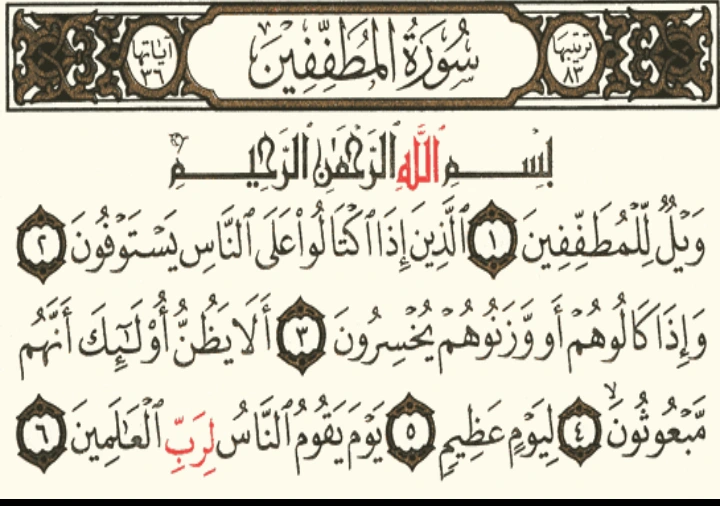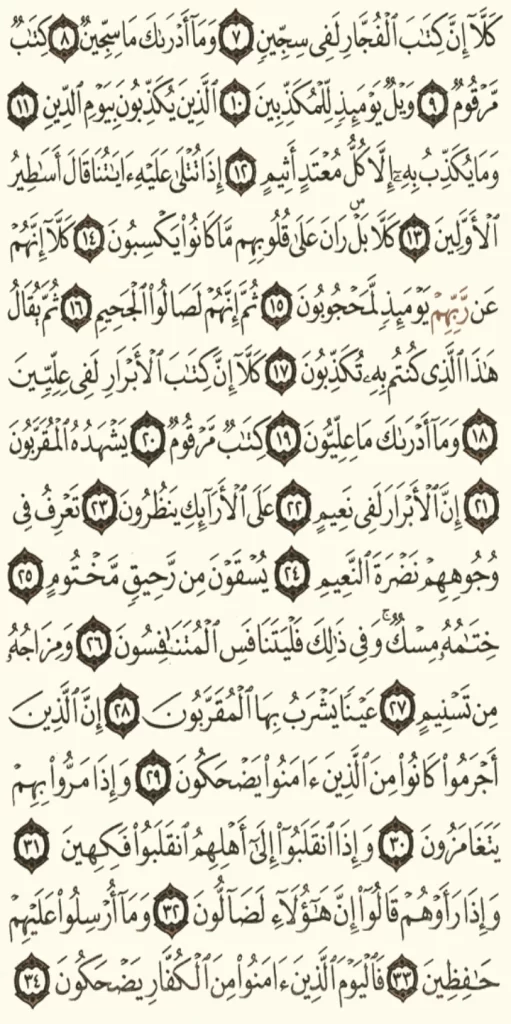Surah Mutaffifin Full Transliteration, Arabic And Translation In English
Surah Mutaffifin is the 83rd surah of the Qur’an. It has 36 verses. Here is the meaning and transliteration of this beautiful chapter.
Advertisements
Summary Of Surah Al Muttaffifin
| Classification | Mecca |
| Names | The Cheats, The Cheaters, Cheating, The Defrauders, The Stinters, The Unjust |
| Surah before | Al-Infitar |
| Surah after | Al-Inshiqaaq |
| Position | 30 juz |
| Number of verses | 36 |
Surah Mutaffifin in Arabic text
بسم الله الرحمن الرحيم
- وَيْلٌ لِّلْمُطَفِّفِينَ
- الَّذِينَ إِذَا اكْتَالُواْ عَلَى النَّاسِ يَسْتَوْفُونَ
- وَإِذَا كَالُوهُمْ أَو وَّزَنُوهُمْ يُخْسِرُونَ
- أَلا يَظُنُّ أُوْلَئِكَ أَنَّهُم مَّبْعُوثُون
- لِيَوْمٍ عَظِيمٍ
- يَوْمَ يَقُومُ النَّاسُ لِرَبِّ الْعَالَمِينَ
- كَلاَّ إِنَّ كِتَابَ الْفُجَّارِ لَفِي سِجِّينٍ
- وَمَا أَدْرَاكَ مَا سِجِّينٌ
- كِتَابٌ مَّرْقُومٌ
- وَيْلٌ يَوْمَئِذٍ لِّلْمُكَذِّبِينَ
- الَّذِينَ يُكَذِّبُونَ بِيَوْمِ الدِّينِ
- وَمَا يُكَذِّبُ بِهِ إِلاَّ كُلُّ مُعْتَدٍ أَثِيمٍ
- إِذَا تُتْلَى عَلَيْهِ آيَاتُنَا قَالَ أَسَاطِيرُ الأَوَّلِينَ
- كَلاَّ بَلْ رَانَ عَلَى قُلُوبِهِم مَّا كَانُوا يَكْسِبُونَ
- كَلاَّ إِنَّهُمْ عَن رَّبِّهِمْ يَوْمَئِذٍ لَّمَحْجُوبُونَ
- ثُمَّ إِنَّهُمْ لَصَالُوا الْجَحِيمِ
- ثُمَّ يُقَالُ هَذَا الَّذِي كُنتُم بِهِ تُكَذِّبُونَ
- كَلاَّ إِنَّ كِتَابَ الأَبْرَارِ لَفِي عِلِّيِّينَ
- وَمَا أَدْرَاكَ مَا عِلِّيُّونَ
- كِتَابٌ مَّرْقُومٌ
- يَشْهَدُهُ الْمُقَرَّبُونَ
- إِنَّ الأَبْرَارَ لَفِي نَعِيمٍ
- عَلَى الأَرَائِكِ يَنظُرُونَ
- تَعْرِفُ فِي وُجُوهِهِمْ نَضْرَةَ النَّعِيمِ
- يُسْقَوْنَ مِن رَّحِيقٍ مَّخْتُومٍ
- خِتَامُهُ مِسْكٌ وَفِي ذَلِكَ فَلْيَتَنَافَسِ الْمُتَنَافِسُونَ
- وَمِزَاجُهُ مِن تَسْنِيمٍ
- عَيْنًا يَشْرَبُ بِهَا الْمُقَرَّبُونَ
- إِنَّ الَّذِينَ أَجْرَمُوا كَانُواْ مِنَ الَّذِينَ آمَنُوا يَضْحَكُونَ
- وَإِذَا مَرُّواْ بِهِمْ يَتَغَامَزُونَ
- وَإِذَا انقَلَبُواْ إِلَى أَهْلِهِمُ انقَلَبُواْ فَكِهِينَ
- وَإِذَا رَأَوْهُمْ قَالُوا إِنَّ هَؤُلاء لَضَالُّونَ
- وَمَا أُرْسِلُوا عَلَيْهِمْ حَافِظِينَ
- فَالْيَوْمَ الَّذِينَ آمَنُواْ مِنَ الْكُفَّارِ يَضْحَكُونَ
- عَلَى الأَرَائِكِ يَنظُرُونَ
- هَلْ ثُوِّبَ الْكُفَّارُ مَا كَانُوا يَفْعَلُونَ
Surah Mutaffifin Transliteration
- Wailul lil mutaffifeen
- Allazeena izak taaloo ‘alan naasi yastawfoon
- Wa izaa kaaloohum aw wazanoohum yukhsiroon
- Alaa yazunnu ulaaa’ika annahum mab’oosoon
- Li Yawmin ‘Azeem
- Yawma yaqoomun naasu li Rabbil ‘aalameen
- Kallaaa inna kitaabal fujjaari lafee Sijjeen
- Wa maa adraaka maa Sijjeen
- Kitaabum marqoom
- Wailuny yawma’izil lil mukazzibeen
- Allazeena yukazziboona bi yawmid deen
- Wa maa yukazzibu biheee illaa kullu mu’tadin aseem
- Izaa tutlaa’alaihi aayaatunaa qaala asaateerul awwaleen
- Kallaa bal raana ‘alaa quloobihim maa kaanoo yaksiboon
- Kallaaa innahum ‘ar Rabbihim yawma’izil lamah jooboon
- Summa innahum lasaa lul jaheem
- Summa yuqaalu haazal lazee kuntum bihee tukazziboon
- Kallaaa inna kitaabal abraari lafee’Illiyyeen
- Wa maaa adraaka maa ‘Illiyyoon
- Kitaabum marqoom
- Yashhadu hul muqarra boon
- Innal abraara lafee Na’eem
- Alal araaa’iki yanzuroon
- Ta’rifu fee wujoohihim nadratan na’eem
- Yusqawna mir raheeqim makhtoom
- Khitaamuhoo misk; wa fee zaalika falyatanaafasil Mutanaafisoon
- Wa mizaajuhoo min Tasneem
- Ainaiy yashrabu bihal muqarraboon
- Innal lazeena ajramoo kaanoo minal lazeena aamanoo yadhakoon
- Wa izaa marroo bihim yataghaamazoon
- Wa izan qalabooo ilaaa ahlihimun qalaboo fakiheen
- Wa izaa ra awhum qaalooo inna haaa’ulaaa’i ladaaal loon
- Wa maaa ursiloo ‘alaihim haafizeen
- Fal yawmal lazeena aamanoo minal kuffaari yadhakoon
- Alal araaa’iki yanzuroon
- Hal suwwibal kuffaaru maa kaanoo yaf’aloon.
Surah Mutaffifin Meaning In English
- 1. Woe to those who give short measure
- 2. Who, when they take by measure from people, demand it in full,
- 3. But if they measure or weigh for them, they give them less than their due.
- 4. Do these people not realise that they will be resurrected
- 5. On a momentous day,
- 6. A day on which humanity will stand before the Lord of the worlds?
- 7. Verily the record of the wicked is in Sijjeen
- 8. And how could you know what Sijjeen is?
- 9. A clearly inscribed record.
- 10. Woe that day to the deniers,
- 11. those who deny the Day of Judgement.
- 12. No one denies it except every transgressor who is steeped in sin.
- 13. When Our revelations are recited to him, he says: This is nothing but tales of the ancients.
- 14. Nay; rather their hearts have been covered with the stain of their misdeeds.
- 15. Nay; verily on that day they will be barred from seeing their Lord.
- 16. Then they will surely enter the blazing fire,
- 17. then it will be said to them: This is what you used to deny.
- 18. Verily the record of the righteous is in ‘llliyoon
- 19. and how could you know what ‘llliyoon is?
- 20. a clearly inscribed record,
- 21. kept with those who are close to Allah.
- 22. Verily the righteous will be in bliss,
- 23. seated on couches, gazing in wonder.
- 24. You will see on their faces the radiance of bliss.
- 25. They will be given to drink pure wine from a sealed container,
- 26. Of which the seal is musk, for that let all aspire, who have aspirations
- 27. And that wine will be mixed with water from the spring of Tasneem,
- 28. A spring from which those who are close to Allah will drink.
- 29. Verily the evildoers used to laugh at those who believed;
- 30. When they passed by them, they would wink at one another [in mockery].
- 31. And when they returned to their homes, they returned exulting.
- 32. When they saw the believers, they said: These people have indeed gone astray,
- 33. although they were not sent to be their keepers.
- 34. But on that day those who believed will laugh at the disbelievers,
- 35. while sitting on couches, gazing around.
- 36. Are the disbelievers requited for anything other than what they used to do?


Surah Mutaffifin Tafseer and Meaning In English
Woe, this is a word of punishment and warning (to those who give short measure.
Allah explains who they are in the following verses: who, when they take by measure from people, demand it in full that is, they take from them in full that which is proven to be their due, demanding it in full with no shortfall.
But if they measure or weigh for them that is, when they give people what is due from them by measure or by weight, they give them less than their due that is, they detract something from it, either by giving short measure or short weight, or by not giving the full measure or weight, and the like.
Advertisements
This is theft of people’s wealth and is being unfair to them. If this is the warning for those who give short measure and short weight, then those who take people’s wealth by force or by stealing are more deserving of this warning.
This verse indicates that just as man wants to take his due from people, he must also give them their due when engaging in business and other dealings with them.
In fact the general meaning of this verse also includes engaging in argument and exchanging views.
Usually both parties in a dispute are eager to present their views; by the same token they must also point out to their opponents any proof that will support their argument of which they are unaware, and they should consider the opponent’s argument just as they consider their own.
In such a situation it will be known how fair-minded or biased a person is, how humble or arrogant he is, and how wise or foolish he is.
Advertisements
We ask Allah to guide us to all that is good.
Then Allah warns those who give short measure, expressing astonishment at their situation and how they persist in wrongdoing, as He says:
Do these people not realise that they will be resurrected on a momentous day, a day on which humanity will stand before the Lord of the worlds?
Advertisements
What makes them have the audacity to give short measure is their lack of belief in the Last Day.
Otherwise, if they did believe in it, and knew that they would stand before Allah, and that He would ask them about their sins both small and great, they would give that up and repent from it.
Verily the record of the wicked this includes every wicked person among all types of disbelievers, hypocrites and evildoers is in Sijjeen.
Then Allah explains that by saying: And how could you know what Sijjeen is?
A clearly inscribed record that is, it is a record in which are recorded their evil deeds.
What is Sijjin in Surah Mutaffifin?
The word Sijjeen refers to a narrow, constricted place. Sijjeen is the opposite of ‘Illiyoon, which is the place where the record of the righteous is kept, as we shall see below.
It was also suggested that Sijjeen is the lowest of the seven earths, the abode of the wicked, where they will dwell in the hereafter. Woe that day to the deniers.
Then Allah explains who the deniers are: those who deny the Day of Judgement that is, the day of requital, the day on which Allah will judge people according to their deeds.
No one denies it except every transgressor who oversteps the sacred limits of Allah and goes beyond that which is permissible to that which is prohibited.
Who is steeped in sin that is, he commits a great deal of sin.
This is the one whose transgression makes him disbelieve and whose arrogance makes him reject the truth.
Therefore When Our revelations are recited to him, that point to the truth and to the truthfulness of that which His Messengers brought, he stubbornly rejects them and says:
This is nothing but tales of the ancients that is, it is nonsense stories of past nations and is not from Allah.
He says this out of arrogance and stubbornness.
As for the one who is fair-minded and whose goal is to seek clear truth, he does not deny the Day of Judgement, because Allah has established for it definitive evidence and clear proof that make it certain, so it has become as clear as day to them.
This is in contrast to those whose hearts have been covered with the stain of their misdeeds and sins, so they are prevented from seeing the truth.
Therefore, as requital for that, they will be prevented from seeing Allah, just as their hearts were prevented from accepting the signs of Allah in this world.
Then, in addition to that severe punishment they will surely enter the blazing fire.
Then it will be said to them by way of rebuke: This is what you used to deny.
Thus Allah mentions three types of punishment that they will face: the punishment of hell, the punishment of blame and rebuke, and the punishment of being kept away from the Lord of the worlds, which implies that He will be angry with them, which will be worse for them than the punishment of the fire.
The meaning of this verse indicates that the believers will see their Lord on the Day of Resurrection and in paradise, and the joy they will find in gazing upon His Countenance will be greater than all other pleasures.
When He addresses them, they will rejoice therein, as Allah mentions in several verses of the Qur’an and as is mentioned in mutawatir reports from the Messenger of Allah.
These verses also contain a warning against sin, for it stains the heart, gradually covering it until its light is extinguished and its ability to recognise things as they are ceases to function, whereupon facts are turned upside down, so that the individual sees falsehood as truth and truth as falsehood.
This is one of the punishments for sin.
Having mentioned that the record of the wicked will be in the lowest and most constricted place, Allah tells us that the record of the righteous will be in the highest and most spacious place, and that their clearly inscribed record is ((kept with those who are close to Allah, namely the noble angels and the souls of the Prophets, the strong and true in faith, and the martyrs, and Allah will declare their renown among those on high.
Illiyoon is the name of the highest part of paradise.
Having mentioned their record, Allah now tells us that they will be in bliss, which is a word that encompasses emotional, spiritual and physical delights.
Seated on couches that are adorned with beautiful cloth gazing in wonderp at what Allah has prepared for them of bliss, and gazing upon the noble Countenance of their Lord.
Youp, O onlooker, will see on their faces the radiance of blissp that is, the glow of pleasure.
For when pleasure and happiness are ongoing, that gives light, beauty and joy to the face.
They will be given to drink pure wine which is the best and most delicious of drinks from a sealed container, of which the seal is muskp.
It may be that what is meant is that it is sealed to prevent anything from being added that may distract from its pleasure or spoil its taste, and that the seal with which it is sealed is musk.
Or it may be that what is meant by the word khitam (translated here as ((seal) is the residue at the bottom of the vessel from which they will drink that pure wine, and that it is the finest musk.
This residue that is left at the bottom of the glass is usually thrown away in this world, but in paradise it will be of that high quality.
For that eternal bliss, of which no one knows the extent of its beauty except Allah.
Let all aspire, who have aspirations that is, let them compete in hastening to do the deeds that will enable one to reach it.
This should be given priority in sacrificing that which is most precious in order to attain it, for it is the most deserving of things which strong men should compete to attain.
That drink will be mixed with water from the spring of Tasneem, which is a spring from which those who are close to Allah will drink.
It is the highest source of any drink in paradise, therefore it is only for those who are close to Allah, who are the highest of people in status.
It will be mixed with nectar and other delicious drinks for the people on the right.
Having mentioned the requital of the evildoers and the reward of the believers, Allah now mentions the immense difference between them.
He tells us that in this world the evildoers used to mock the believers, making fun of them, laughing at them and winking in derision at one another when they passed by them, out of scorn and contempt towards them, yet despite that they felt secure, and no fear ever crossed their minds.
And when they returned to their homes in the morning or evening, they returned exulting that is, happy and rejoicing.
This was one of the greatest signs of their delusion, that they combined the worst of deeds with a sense of being secure in this world, to the extent that it was as if they had received a covenant and promise from Allah that they would be among the blessed, and they regarded themselves as being guided and the believers as being misguided.
This was a fabrication against Allah, for they dared to speak about Him without knowledge.
Although they were not sent to be their keepers that is, they were not sent to be in charge of the believers and were not given the task of keeping a record of their deeds, such that they should be keen to accuse them of being misguided.
This was nothing more than stubbornness, obstinacy and foolishness on their part, for which they had no proof or evidence.
Therefore the requital in the hereafter will match their deeds.
But on that day namely the Day of Resurrection those who believed will laugh at the disbelievers when they see them immersed in punishment, when all that they used to fabricate will be lost from them.
The believers will be in the utmost comfort and security, sitting on couches that are beautifully adorned, gazing around at that which Allah has prepared for them of bliss, and gazing upon the noble Countenance of their Lord.
Are the disbelievers requited for anything other than what they used to do?
That is, they will be given a recompense that matches their deeds.
Just as they laughed at the believers in this world and accused them of being misguided, the believers will laugh at them in the hereafter, and they will see them subjected to a punishment that is the requital for misguidance.
Yes, they will be requited for what they used to do, on the basis of divine justice and wisdom, for Allah is All-Knowing, Most Wise.
This is the end of the commentary on Soorat al-Mutaffifeen.
All praise and thanks are for Allah, and may the blessings and peace of Allah be upon Prophet Muhammad, his family, and his Companions abundantly until the Day of Judgement.
Read also Surah Taghabun Full Transliteration And Meaning In English
Advertisements








4 Comments